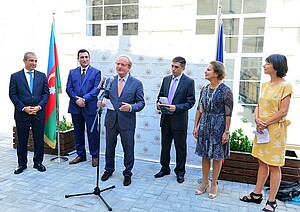Publication date: 27/09/16
ThemesNews
Initiated by the French government and piloted by the University of Strasbourg, the Franco-Azerbaijan University (Université franco-azerbaïdjanaise Ufaz) has opened its doors on 15 September 2016. Feedback on the cooperation with Eckhart Hötzel, director of the Institut de traducteurs, d'interprètes et de relations internationales (Itiri) an project leader for Unistra.
Could you remind us the origins of the partnership?
The project was initiated in 2014 following a visit of the French president to Azerbaijan. During this visit, the two countries’ presidents decided to create a Franco-Azerbaijan university. The goal for France was to secure academic presence in a newly industrialising country by a specific cooperation, like the Institute Sorbonne-Kazakhstan which has been created in 2014. Alain Beretz, president of the University of Strasbourg, and me have been invited to a first meeting in the Elysée palace. Back then, they had the idea that several French universities should be project partners. After some visits in the country and according to the explicit wish of Baku, the University of Strasbourg took on to the project management in order to create three bachelor programmes, in process engineering, informatics, and geophysics. An additional bachelor programme in instrumentation of oil exploration and exploitation will be created under the leadership of the University of Rennes.
What is Azerbaijan’s ambition for this project and why is the University of Strasbourg interested in this partnership?
Azerbaijan spends a lot of money on specialists from abroad. However, the country wants to change strategy and benefit from French expertise in order train its own specialists in strategic areas as the oil industry. The University of Strasbourg’s interest consists in the possibility of recruiting well-trained students from abroad within the framework of PhD-programmes in a couple of years. But the challenge is first to create a whole sector there.
Will French students be allowed to study at the Ufaz?
This is not planned at the moment. The project is not supposed to be an Erasmus programme but rather French degrees delocalised to Baku in order to train the students in the country.
How did the awarding of places to Azerbaijan students work?
To be admitted to university in Azerbaijan, the students not only have to pass their A-levels but also a national exam. The best students are granted privileged access to the Azerbaijan universities. This group was allowed by the ministry of education to apply for Ufaz. Of 350 candidates, 160 were then admitted to a second round which consisted in testing their competences in the taught disciplines as well as in English, the language all classes will be held in.
How are the classes organised?
Azerbaijan, by financing this project, had one condition, namely that 50% of the classes would be held by a French team. We therefore recruited two young fulltime professors who will be on site. In addition to them, there will be four other, temporarily teachers. The rest of the classes will be covered by intermittent French professors. We hope that colleagues from other universities will join the project.
Will the Ufaz increase in power?
Absolutely, the goal is to set up a master programme as logic succession to the bachelor degree, but also to diversify the offer. The Ecole et observatoire des sciences de la Terre (Eost) will, for example, offer a very specialised master programme in seismology. However, the priority at the moment is to succeed the start of the semester to make the bachelor programmes work.
















